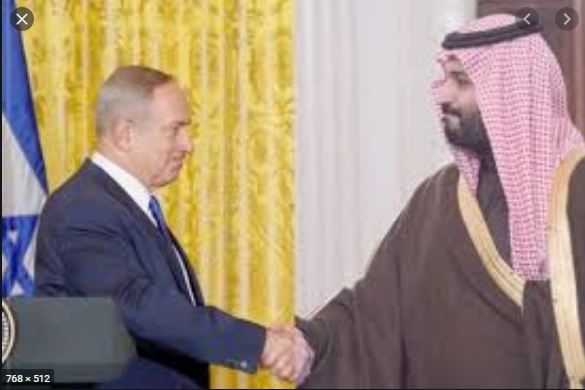Virendra Pandit
New Delhi: The no-longer-secret meeting of Israeli Prime Minister Benjamin Netanyahu with US Secretary of State Mike Pompeo and Crown Prince Mohammad Bin Salman in Saudi Arabia points to the emerging alliance against Iran, whose nuclear-armed neighbor Pakistan and friend North Korea may have to face not just music but a geopolitical orchestra beginning 2021—the ultimate target being China.
On its part, Saudi Arabia is trying to wean away Pakistan from both Iran and China and force it to recognize Israel. This would be a prelude to Riyadh also following suit. Clearly, Islamabad is in a Catch-22 position—by doing so, it could antagonize Iran, Turkey, and China; by not doing so, it would make the Arab financiers angry.
The November 22 meeting of the US, Israeli and Saudi leaders was the next phase of the “Abraham Accords” signed by Israel with the leaders of UAE and Bahrain in September in the US where they were hosted by President Donald Trump.
In the fast-changing, kaleidoscopic scenario in the Middle East, different coalitions are being worked out, each having a short shelf-life. In December 2019, for example, an anti-Arab axis seemed to be emerging within the Saudi-led, 57-nation Organization of Islamic Conference (OIC). It was supposed to be led by Turkey, with support from Pakistan and Malaysia. But the Saudis torpedoed it by arm-twisting a bankrupt Pakistan to quit.
Within a year, however, the Saudi focus has shifted from a Sunni Turkey to a Shia Iran. By doing so, Riyadh is attempting to shield its Sunni, Arab, and Islamic leadership against both Turkey and Iran.
On its part, Turkey is firing on all cylinders to smell the emergent opportunities that could take it closer to its goal of the resurrection of the Ottoman Empire, which collapsed a century ago. It has been funding, arming, sponsoring, and supporting all shades of Islamic militants across the Middle East and North Africa in what it considers were the ‘client states’ of the Empire until the 1920s.
It is in this new geopolitical situation that the next possible US President, Joe Biden, would find himself
Interestingly, the transition of power in America is yet to begin, officially, as President Trump is still digging in to continue in the second term. His Secretary of State Mike Pompeo’s presence in the Sunday meeting was part of this assertion. Trump is apparently hopeful of the courts eventually turning the electoral verdict in his favor.
Despite anti-Trump media hype in favor of Joe Biden, uncertainty prevails in the US power-game. That is why Russia and China are yet to officially congratulate Biden.
It is in this context that the Sunday meeting assumes importance.
For the first time, Netanyahu traveled to Saudi Arabia to meet Crown Prince MBS, an Israeli official confirmed on Monday, indicating that the two countries are coming closer against Iran.
Earlier, Israeli media said Netanyahu had secretly flown on Sunday to Neom, on the Red Sea, for talks with MBS and Pompeo. The leaders left their respective media teams guessing as they ‘disappeared’ for three hours.
So secret was this meeting that even Saudi Arabia’s foreign minister, Prince Faisal bin Farhan Al Saud, was in the dark. He denied the three leaders met, saying only the Saudis and the Americans did.
Even Netanyahu and Pompeo denied this clandestine meeting.
But Yoav Gallant, a member of Netanyahu’s security cabinet, told Army Radio: “The very fact the meeting happened, and was outed publicly, even if half-officially right now, is a matter of great importance.”
And, Israeli Defence Minister Benny Gantz condemned “the irresponsible leak of the secret flight to Saudi Arabia”.
That was how the cat jumped out of the bag.
The tripartite meeting is being seen as an apparent message to U.S. President-elect Joe Biden: that there could be no return to the 2015 Iran nuclear deal abandoned by President Donald Trump.
Biden had said that he would re-join the nuclear accord that world powers had signed with Iran if Tehran first resumed strict compliance with the deal, and would work with allies to strengthen its terms.
Since August, Riyadh had allowed Israeli airliners to overfly Saudi territory to various Gulf destinations and Asia, an indication that Riyadh was cautiously closing ranks with Jerusalem.
Angry Palestinian militant groups have condemned the news of a softer Saudi line on their enemy, Israel. Palestinian Islamic Jihad called it “a betrayal of Jerusalem, blessed Mecca and Medina”.
Interestingly, Mossad director Joseph (Yossi) Cohen, who has spearheaded discreet diplomatic outreach to Gulf Arab states, had also accompanied Netanyahu on his first Saudi trip.
Fireworks are, therefore, expected to explode soon!

